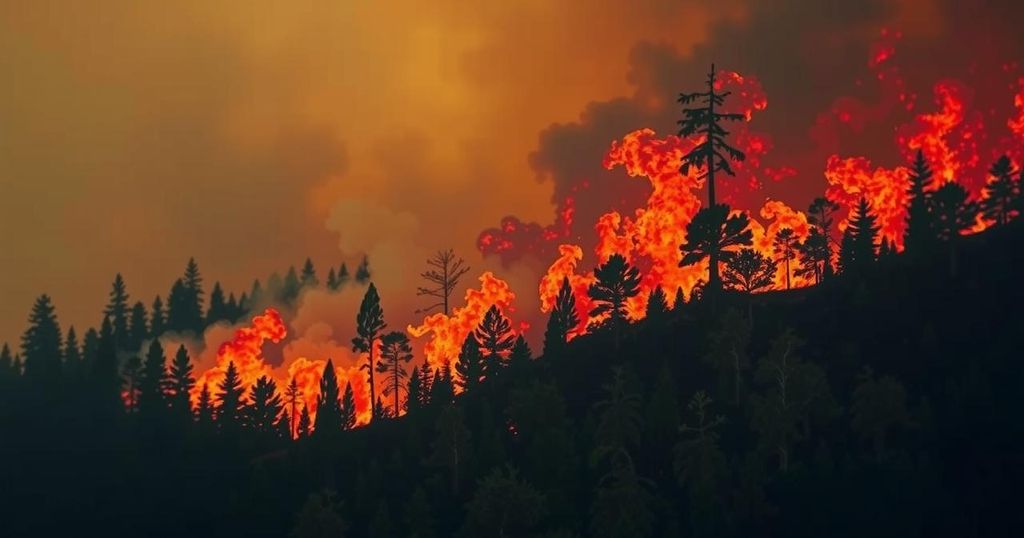Impact of Climate Change on Wildfire Smoke Pollution and Public Health

New research indicates that global warming may lead to an additional 12,000 deaths annually due to smoke pollution from wildfires. The studies reveal that while climate change is exacerbating wildfire risks, human activities have also modified burn areas, resulting in complex health implications worldwide, particularly from PM2.5 exposure.
Recent research has unveiled alarming insights into the health consequences of smoke pollution from wildfires, suggesting that global warming may be responsible for an additional 12,000 annual fatalities due to smoke inhalation. The findings, published in the journal Nature Climate Change, indicate that climate change is exacerbating the health risks associated with wildfire smoke, particularly in regions such as Australia, South America, Europe, and the boreal forests of Asia. In a specific analysis led by Dr. Chae Yeon Park from Japan’s National Institute for Environmental Studies, it was estimated that nearly 100,000 individuals perished each year due to complications resulting from particulate matter (PM2.5) emitted by wildfires. This fine particulate matter is known to deeply penetrate lung tissues and the bloodstream, leading to severe health issues. The research further elaborated on the intricate relationship between climate change and wildfire incidents. While global warming has contributed to an increase in burned areas by approximately 16% from 2003 to 2019, human actions, such as land clearing for agricultural or infrastructural purposes, have contributed to a 19% reduction in total burned areas. This paradox underscores the complexity of evaluating how anthropogenic climate change interacts with natural wildfire dynamics. To dissect these relationships, researchers employed three models of global vegetation and fire activity under present-day climate conditions, comparing them to a scenario devoid of contemporary climate change effects. The results consistently indicated that rising temperatures and reduced humidity significantly heighten the risk of wildfires, thereby increasing health risks. Professor Hilary Bambrick, Director of the National Centre for Epidemiology and Population Health at the Australian National University, emphasized the severity of smoke pollution exposure during the intense wildfires in Australia in 2019 and 2020, stating that “This resulted in hundreds of deaths at the time, and will likely have long-term health consequences for many.” Additionally, a parallel study led by scholars from Belgium and the United Kingdom corroborated these findings, highlighting that climate change is notably elevating wildfire risks, especially in critical zones such as Siberia and African savannas. Professor Wim Thiery from Vrije Universiteit Brussel aptly noted that “the effect of climate change continues to grow” alongside the diminishing impacts of human-induced landscape changes. The evidence suggests a critical need for public health strategies addressing the health impacts of wildfire smoke, as the toxicity of fire-originating particles may be more detrimental than those from other pollution sources, indicating the escalating dangers posed by climate change-driven environmental changes.
The increase in global temperatures due to climate change has been linked to a rise in the frequency and intensity of wildfires worldwide. These fires not only devastate ecosystems but also contribute to significant health risks due to smoke pollution, particularly through the emission of PM2.5 particles. Understanding the correlation between climate change, human activities, and wildfire dynamics is essential for developing effective public health interventions and environmental policies. Given the rise in wildfire incidents, it is crucial to analyze both natural and anthropogenic factors contributing to this increase, as well as their respective health impacts on global populations.
In summary, recent research underscores a troubling correlation between global climate change and the increase in mortality associated with wildfire smoke, with an estimated additional 12,000 deaths annually. The studies elucidate how rising temperatures and human-induced alterations to landscapes interact to influence fire dynamics and health outcomes. Enhanced awareness of the toxicity of wildfire emissions and the health implications of climate change is vital for formulating public health strategies and environmental policies aimed at mitigating these risks.
Original Source: www.theguardian.com






